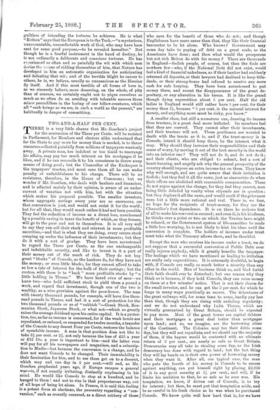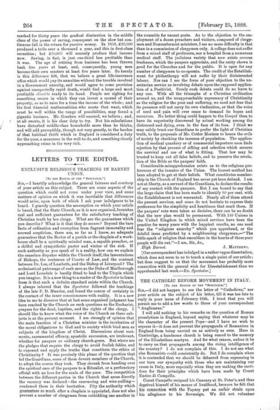TWO-AND-A-HALF PER CENT.
THERE is a very little chance that Mr. Goschen's project for the conversion of the Three per Cents, will be resisted in Parliament, for Members and electors alike understand that for the State to pay more for money than is needed, is to throw resources collected painfully from millions of taxpayers wantonly away. A private man, too indolent or too timid to rearrange his affairs, may pay too much interest on his mortgages if he likes, and if he can reconcile it to his conscience to throw away means of doing good, but the Chancellor of the Exchequer is the taxpayers' trustee, and must save them all he can under penalty of unfaithfulness to his charge. There will be no resistance, therefore, in the House of Commons ; but we wonder if Mr. Goschen, who deals with bankers and financiers, and is affected mainly by their opinion, is aware of an under- current of vexation not with him, but with the situation which makes his proposal possible. The smaller investors, whose aggregate savings every year are so enormous, see that conversion is just, and would not resist it for the world ; but for all that, they would much rather it had not been possible. They feel the reduction of income as a direct loss, unredeemed by a possible saving in taxes the benefit of which, as they foresee, will go to the poor and not to themselves. It is all very well to say they can sell their stock and reinvest in more profitable securities,—and that is what they are doing, every secure stock creeping up under the influence of their investments ; but they do it with a sort of grudge. They have been accustomed to regard the Three per Cents, as the one unchangeable and indubitable security, and like to invest in it a part of their money out of the reach of risk. They do not bay great " blocks " of Consols, as the bankers do, for they have not the money ; or even little blocks, for they cannot afford to take so low a rate of interest for the bulk of their savings ; but the custom with them is to " back " more profitable stocks by "a little holding in Threes." We have heard even of men—we know two—who hold sufficient stock to yield them a pound a week, and regard that investment, though one of the two is wealthy, as a wise provision against the poor-house. The man with twenty thousand pounds, for example, will have five thou- sand pounds in Threes, and feel it a sort of protection for the two thousand pounds or so of "rubbish "—Greek Stock, Rou- manian Stock, Japanese Stock, or what not—which so greatly raises the average dividend upon his entire capital. It is a protec- tion, too, as far as income is concerned, for if the weak bonds are repudiated, or reduced, or suspended for twelve months, a transfer of the Consols to any decent Four per Cents, restores the balance of spendable income. A man in that position does not like to take 21 per cent. or 21, not only because the loss of £25 a year or 212 10a. a year is important to him—and the latter sum
will pay for all his newspapers and magazines, and a subscrip- tion to Mudie—but because the conversion is a change, and be does not want Consols to be changed. Their immutability is their fascination for him, and to see them get on to a descent, which may end one day in 2 per cent.—will end, as Mr. Goschen prophesied years ago, if Europe escapes a general war—is, if not exactly irritating, distinctly unpleasing to his mind. He would like Consols to stop at a hundred, and be hanged to them ! and not to rise in that preposterous way, out of all hope of being let alone. In France, it is said this feeling is a potent force at elections, the peasantry regarding a "con- version," such as recently occurred, as a direct robbery of those
who save for the benefit of those who do not ; and though Englishmen have more sense than that, they like their financial barometer to be let alone. Who knows ? Government may some day take to paying off debt on a great scale, as the Americans have done ; and then what would the prosperous but not rich Briton do with his money ? There are thousands in England—foolish people, of course, but then the fools are nowhere few—who, if the National Debt did not exist, would feel a kind of financial nakedness, as if their banker had suddenly returned all deposits, or their lawyers had declined to keep title- deeds, or their strong-boxes had refused to receive any more cash for safe keeping. They have been accustomed to put money there, and resent the disappearance of the great de- positary, or any alteration in his terms. It is like the grand though dying superstition about 5 per cent. Half the old ladies in England would still rather have 5 per cent, for their money than 5i, because "5 per cent, is the natural interest for money, and anything more must be risky, you know."
A smaller class, but still a numerous one, drawing its income from trustees, is a great deal more irritated. Its members feel that they are coerced. They cannot alter their investments, and their trustees will not. Those gentlemen are worried to death with the trusts as it is, and if the trust-money is in Consols, intend it should keep there, be the interest what it may. Why should they increase their responsibilities and their sense of worry, by moving it out of the best security in the world into an inferior one ? They will not do it, and do not do it ; and their clients, who are obliged to submit, feel a sort of heart-burning, and angrily ask why the general prosperity of the country should impose an extra income-tax on them. They know why well enough, and are quite aware that their irritation is foolish ; but they feel it all the same, just as sinecurists do when their offices are abolished with reasonable compensation. These do not argue against the change, for they feel they cannot, men being little deluded by vanity when stipends are in question ; but they deplore it all the same, and would exult if the grievance were but a little more rational and real. There is, we fear, no hope for the recipients of trust-money, for they are the Chancellor's first dependence. It is on them be reckons first of all to make his conversion succeed ; and even if, in his kindness, he thinks over a point or two on which the Trustee laws might be relaxed, or the Government system of life-annuities be made a little less worrying, he is not likely to hint his ideas until the conversion is complete. The holders of incomes under trust must take what the Treasury allows them, and be thankful.
Except the man who receives his income under a trust, we do not suppose that a successful conversion of Public Debt ever really injures anybody, while it greatly benefits the taxpayer. The feelings which we have mentioned as leading to irritation are really only superstitions. It is extremely doubtful, to begin with, if Consols are really so much better a security than any other in the world. Men of business think so, and God forbid their faith should ever be disturbed ; but one reason why they think so is because, if they hold Consols, they can raise money on them at a few minutes' notice. That is not their charm for the small investor, and he can get the 3 per cent, for which he longs in many ways practically as secure. The debentures of the great railways will, for some time to come, hardly pay less than that, though they are rising with unfailing regularity; and we do not understand why India Threes, which are virtually guaranteed by Great Britain, should be expected to pay more. Most of the great towns are capital debtors and their mortgages a great deal better than mortgages upon land ; and so, we imagine, are the borrowing cities of the Continent. The Colonies may tax their debts some day, but they will not repudiate, and we should say the majority of them, if the buyers would be contented with an ultimate return of 3 per cent., are nearly as safe as Great Britain. Democracies may all take to stealing some day, as the Irish democracy has done with regard to land ; but the last thing they will lay hands on is their own power of borrowing money when they want it. After all, our typical case, the man who puts the fourth of his money in Consols to be secure against anything, can put himself right by placing £2,000 of it in any good security at 31 per cent., and will, if he limits his ambition to that, be as safe as he ever was. His temptation, we know, if driven out of Consols, is to try for interest ; but then, he must put that temptation aside, and be as careful in his fresh choice as he was when he purchased Consols. We know quite well how hard that is, for we have
marked for thirty years the gradual diminution in the middle class of the power of saving, consequent on the slow but con- tinuous fall in the return for passive money. In 1858, £20,000 produced a trifle over a thousand a year, and this in first-class securities ; bat 230,000 will scarcely produce that income now. Saving, in fact, is just one-third less profitable than it was. The age of retiring from business has been thrown back five years at least, and, consequently, young men become their own masters at least five years later. So keenly is this difference felt, that we believe a great life-insurance office which would pay its annuities without the trouble involved in a Government annuity, and would agree to some provision against unexpectedly rapid death, would find a large and most profitable clientele ready to its hand. People are sighing for something secure in which they can invest a morsel of their property, so as to raise for a time the income of the whole ; and the first financial mathematician who meets that want, which must be well within the range of possibilities, may found a gigantic business. Mr. Goschen will succeed, we believe ; and, at all events, it is his clear duty to try. But his calculations have disturbed middle-class households more than he thinks, and will add perceptibly, though not very greatly, to the burden of that habitual thrift which in England is considered a duty for the poor, a meanness in the well-to-do, and something closely approaching crime in the very rich.







































 Previous page
Previous page